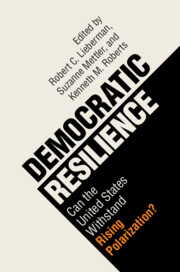Book contents
- Democratic Resilience
- Democratic Resilience
- Copyright page
- Dedication
- Contents
- Figures
- Tables
- Contributors
- Acknowledgments
- Part I Why Might Polarization Harm Democracy?
- Part II Political Institutions in Polarized Times
- Part III Social Polarization and Partisanship
- Part IV Vicious Circles? The Relationship between Polarized Behavior and Institutions
- 11 Polarization, the Administrative State, and Executive-Centered Partisanship
- 12 Laboratories of What?
- 13 Conservative Extra-Party Coalitions and Statehouse Democracy
- Part V Can Political Action Save Democracy in Polarized Times?
- Index
11 - Polarization, the Administrative State, and Executive-Centered Partisanship
from Part IV - Vicious Circles? The Relationship between Polarized Behavior and Institutions
Published online by Cambridge University Press: 20 November 2021
- Democratic Resilience
- Democratic Resilience
- Copyright page
- Dedication
- Contents
- Figures
- Tables
- Contributors
- Acknowledgments
- Part I Why Might Polarization Harm Democracy?
- Part II Political Institutions in Polarized Times
- Part III Social Polarization and Partisanship
- Part IV Vicious Circles? The Relationship between Polarized Behavior and Institutions
- 11 Polarization, the Administrative State, and Executive-Centered Partisanship
- 12 Laboratories of What?
- 13 Conservative Extra-Party Coalitions and Statehouse Democracy
- Part V Can Political Action Save Democracy in Polarized Times?
- Index
Summary
Fierce partisan conflict in the United States is not new. Throughout American history, there have been polarizing struggles over fundamental questions relating to the meaning of the Declaration, the Constitution, and the relationship between the two. These struggles over ideals have become all encompassing when joined to battles over what it means to be an American – conflicts that have become more regular and dangerous with the rise of the administrative state. The idea of a “State” cuts more deeply than suggested by Max Weber’s definition of “a human community that (successfully) claims the monopoly of the legitimate use of physical force within a given territory.” Beyond the powers of government, the State represents a centralizing ambition (at least for progressive reformers) to cultivate, or impose, a vision of citizenship. In Randolph Bourne’s words, the State is a “concept of power” that comes alive in defense of or in conflict with an ideal of how such foundational values of Americanism as “free and enlightened” are to be interpreted and enforced. The ideal is symbolized not by the Declaration and the Constitution but rather in rallying emblems such as the flag and Uncle Sam.
Keywords
- Type
- Chapter
- Information
- Democratic ResilienceCan the United States Withstand Rising Polarization?, pp. 267 - 296Publisher: Cambridge University PressPrint publication year: 2021

